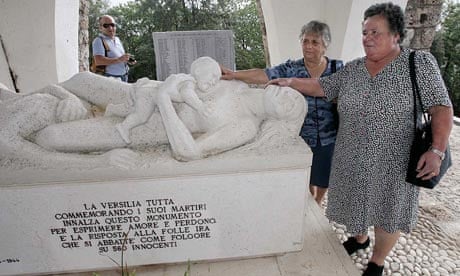Italian survivors of a wartime Nazi massacre have reacted angrily to a German court's decision to abandon an investigation into eight former SS soldiers who have already been convicted in Italy for their role in the killing.
The former soldiers – who are still alive – were sentenced to life imprisonment in 2005 by an Italian military court for participating in the murder of more than 500 Italians, including more than 100 children, on 12 August 1944, in the Tuscan village of Sant'Anna di Stazzema.
While hunting for partisans, the SS shot villagers and pushed others into basements and threw grenades at them.
Germany has not allowed the extradition of the convicted soldiers, and on Monday a court in Stuttgart ruled it did not have evidence that pinned individual soldiers to the killings.
"Belonging to a Waffen-SS unit that was deployed to Sant'Anna di Stazzema cannot replace the need to prove individual guilt," the prosecutors said at the end of a 10-year investigation.
An organisation representing survivors of the massacre said it would appeal against the decision in Germany, while the mayor of the village, Michele Silicani, said he would urge Italy's justice minister to lobby Germany to reopen the case.
Enrico Pieri, who was 10 when the raid occurred and witnessed his family being executed, called the verdict "a scandal".
"The shelving of this investigation offends the memory of Italians," said Democratic Party senator Andrea Marcucci.
"Some of those convicted have given interviews in which they admitted their role in the massacre," said Marco De Paolis, an Italian military magistrate .
De Paolis also disagreed with the decision by German prosecutors that the massacre was impromptu and not planned. "This was not a casual episode but a real massacre planned to the last detail," he said.
